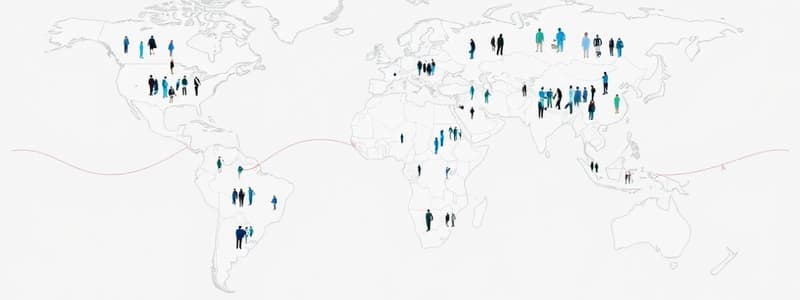Podcast
Questions and Answers
What is a characteristic of core countries in global stratification?
What is a characteristic of core countries in global stratification?
- High income inequality
- Diversified economies (correct)
- Weak central governments
- Reliance on single economic activities
Which of the following is a typical example of a periphery country?
Which of the following is a typical example of a periphery country?
- Germany
- Japan
- Canada
- Brazil (correct)
What does modernization theory primarily focus on?
What does modernization theory primarily focus on?
- Interconnectedness of cultures
- Dependence of periphery countries on core countries
- Technological advancements in economies (correct)
- Historical trade routes
Which perspective emphasizes the inequality in power and resources on a global scale?
Which perspective emphasizes the inequality in power and resources on a global scale?
Which of the following has resulted from the process of globalization?
Which of the following has resulted from the process of globalization?
What is a common implication of globalization mentioned in the content?
What is a common implication of globalization mentioned in the content?
What is dependency theory primarily concerned with?
What is dependency theory primarily concerned with?
Which region is typically associated with high income inequality and weak governments?
Which region is typically associated with high income inequality and weak governments?
What do dependency theory and structural barriers primarily highlight?
What do dependency theory and structural barriers primarily highlight?
What is a key aspect in achieving a more equitable global order according to the content?
What is a key aspect in achieving a more equitable global order according to the content?
What role do semi-periphery countries like India and Brazil play in the global economic system?
What role do semi-periphery countries like India and Brazil play in the global economic system?
Which theory has critiques that encourage context-specific approaches to development?
Which theory has critiques that encourage context-specific approaches to development?
Which of the following is a central assumption of modernization theory?
Which of the following is a central assumption of modernization theory?
Why is it important to empower local voices in development strategies?
Why is it important to empower local voices in development strategies?
What ultimate goal is associated with the collaborative approach to development?
What ultimate goal is associated with the collaborative approach to development?
What is a significant critique of modernization theory?
What is a significant critique of modernization theory?
How does dependency theory differ from modernization theory?
How does dependency theory differ from modernization theory?
According to dependency theory, what is a primary reason for the underdevelopment of Third World countries?
According to dependency theory, what is a primary reason for the underdevelopment of Third World countries?
What limitation is often associated with dependency theory?
What limitation is often associated with dependency theory?
Which of the following reflects a belief of dependency theorists regarding economic relationships?
Which of the following reflects a belief of dependency theorists regarding economic relationships?
What is one of the assumptions of modernization theory regarding the path of development?
What is one of the assumptions of modernization theory regarding the path of development?
What distinguishes the hyper globalist perspective on globalization?
What distinguishes the hyper globalist perspective on globalization?
Which perspective views globalization as a process that may lead to less importance of national governments?
Which perspective views globalization as a process that may lead to less importance of national governments?
What does the skeptical perspective mainly emphasize about globalization?
What does the skeptical perspective mainly emphasize about globalization?
How is modernization defined in this context?
How is modernization defined in this context?
What is a common criticism of the definition of development presented in the content?
What is a common criticism of the definition of development presented in the content?
What do historical legacies contribute to in global stratification?
What do historical legacies contribute to in global stratification?
Which factor does NOT contribute to the disparities seen in global stratification?
Which factor does NOT contribute to the disparities seen in global stratification?
What aspect of globalization does the skeptical perspective question?
What aspect of globalization does the skeptical perspective question?
Flashcards are hidden until you start studying
Study Notes
Theories of Global Stratification
- Global stratification refers to the uneven distribution of wealth, power, and resources globally, leading to significant social implications.
- Key theories: Globalization Theory, World-Systems Theory, Modernization Theory, Dependency Theory.
Globalization Theory
- Globalization is the exchange of culture, money, and products across borders facilitated by international trade and technological advancements.
- Influential perspectives include:
- World-Systems Theory: Examines the global economy, categorizing countries into core, periphery, and semi-periphery based on economic strength and political influence.
- Modernization Theory: Suggests that all societies evolve similarly, with traditional societies advancing by adopting features of Western industrialized nations.
- Dependency Theory: Critiques modernization by focusing on the exploitative relationships between wealthy core countries and dependent periphery nations.
World-Systems Theory
- Core Countries: Western Europe and the United States, with strong economies and significant political influence.
- Periphery Countries: Latin America and Africa, marked by economic reliance on raw materials, weak governance, and income inequality.
- Semi-Periphery Countries: Countries like India and Brazil, with developing economies acting as intermediaries in the global system.
Modernization Theory
- Proposes a linear path of development, encouraging traditional societies to emulate Western models for progress.
- Criticized for its Eurocentric perspective, overlooking the unique historical and cultural contexts of different nations.
Dependency Theory
- Focuses on the exploitative economic relationships between core and periphery nations, leading to the latter’s dependence on the former.
- Argues that the dominance of core countries contributes to ongoing global inequality and limits self-sustained growth in the Global South.
Perspectives on Globalization
- Hyper Globalist: Views globalization as a legitimate process leading to an interconnected global society.
- Skeptical: Raises concerns that globalization may be regionalizing rather than truly globalizing, questioning the erosion of national sovereignty.
- Transformationalist: Believes in evolving global interactions that challenge traditional governance and create a dynamic world order.
Comparison of Key Concepts
- Globalization: Sharing of cultural and economic resources through international trade.
- Modernization: Transition of less-developed nations toward industrialized characteristics, often critiqued for western bias.
- Development: Aimed at enhancing human welfare, often reflecting colonial power dynamics.
Dynamics of Global Stratification
- Uneven Distribution: Reflects significant disparities in wealth and influence among countries.
- Historical Legacies: Disparities rooted in historical factors like colonialism and resource exploitation.
- Structural Barriers: Highlighted by dependency theory, emphasizing obstacles for Global South countries in achieving development.
Towards a More Equitable Global Order
- Critiques of existing theories advocate for more nuanced, context-specific development strategies.
- Emphasis on collaboration among countries to address shared challenges and exchange resources effectively.
- The importance of empowering local voices to ensure development strategies align with the needs of diverse populations globally.
Studying That Suits You
Use AI to generate personalized quizzes and flashcards to suit your learning preferences.




